The degree to which third grade teachers practice number sense skills in teaching mathematics
الملخص
The aim of the research is to investigate the degree to which third-grade teachers practice number sense skills in teaching mathematics, and to identify the differences in their views on the degree of their practice of these skills according to the two variables (years of experience and training courses), to achieve the objectives of the research, the descriptive analytical approach was used, which was designed A questionnaire consisting of (34) items, distributed on two axes (implementation and evaluation), and was applied during the second semester of the 2021-2022 school year. A sample of (150) male and female teachers were filled out in the schools of the first cycle of basic education in the city of Hama.
The results of the study showed:-
The degree to which the third grade teachers practice number sense skills in teaching mathematics came at a high rate. There are statistically significant differences attributable to the variable number of years of experience from the teachers' point of view about the degree to which they practice numerical sense skills, in favor of the longer number of years of experience.
There are statistically significant differences attributable to the variable of training courses about the degree to which teachers practice number sense skills in favor of teachers who have followed one or more educational courses.
References
- الرباط، بهيرة شفيق. (2012). برنامج قائم على أنشطة الترابطات الرياضياتية في تنمية الحس العددي في مقرر الرياضيات لدى تلميذات الصف الخامس الابتدائي. مصر: دراسات في المناهج وطرق التدريس، (189).
- السعيد، رضا مسعد. (2005). الحس العددي. مجلة البحوث النفسية والتربوية: مجلد (4)، الصفحات 176-212.
- المغربي، نبيل. (2012). العلاقة بين الحس العددي والذكاء العددي والتحصيل في الرياضيات لدى طلبة الصف السابع الأساسي في محافظة الخليل. مجلة جامعة الأقصى، 10(2).
- الكبيسي، عبد الواحد حميد، عبدالله، مدركة صالحة. (2015). القدرات العقلية والرياضيات. الأردن: دار الاعصار العلمي.
- العقبي، الهام. (2007). تنمية الحس العددي لدى طلبة الصف الأول المتوسط. مجلة كلية التربية الإسلامية، 3(51).
- المحرز، هناء حسن. (2018). مدى توفر مهارات الحس العددي لدى تلاميذ الحلقة الثانية من التعليم الأساسي. المجلة التربوية:مصر،127(32).
- سعد، أحمد. (2011). أثر استراتيجية تدريس مقترحة في تنمية الحس العددي والثقة بالنفس والاتجاه نحو الرياضيات لدى تلاميذ السنة الأولى من التعليم المتوسط. الجزائر: جامعة الحاج خضر، رسالة دكتوراه غير منشورة.
- شعبان، حنفي شعبان، المنير، راندا عبد العليم. (2012). تعليم الرياضيات لدى صعوبات التعلم. الأردن: مركز ديبونو للنشر والتوزيع.
- معتوق، نادية هملان. (2020). فاعلية استخدام الحساب الذهني في تنمية بعض مهارات الحس العددي لدى طلبة الصف الثالث الأساسي. مجلة العلوم التربوية والنفسية، 43(4).
- عبيدات، ذوقان وآخرون. البحث العلمي مفهومه وأدواته وأساليبه. الرياض: دار أسامة للنشر.
- عبيدة، ناصرة. (2002). استراتيجية تدريسية مقترحة لتنمية الحس العددي وأثرها على الأداء الحسابي لتلاميذ الصف الخامس الابتدائي. مصر: جامعة المنوفية، رسالة ماجستير غير منشورة.
- عفانة، هناء. (2012). أثر برنامج مقترح لتنمية مهارات الحس العددي لدى طالبات الصف الخامس الأساسي. غزة: الجامعة الإسلامية، رسالة ماجستير غير منشورة.
- حاكمه، نورا. (2018). فاعلية برنامج قائم على نموذج شوارتز في تنمية مهارات التواصل الرياضي والحس العددي لدى تلاميذ الصف السابع الأساسي. جامعة التربية: كلية البعث، رسالة دكتوراه.
- Dehaene. What are Numbers Really are? A Cerebral Basis for Number Sense, available at: www>EDGE.com. (1997).
- Gersten, Ressell & David, Charld. Number sense: Rethinking Arithmetics Instruction for Students With mathematical Disabilities. Journal For Especial Education. Vol (33). (1999)
- National Council of Teachers of Mathematics. Principles and Standards for School Mathematics. Reston, VA: National Council of Teachers of Mathematics. (2000).
- Reys, R. & Yang D. Relationship Between Computational Performance and Number Sense Among Sixth and Eighth grade Students in Taiwan. Journal for Research in Mathematics Education, vol. 29(2) pp225-237. (1998).
- Schneider & Thompson. Incredible Equations Developed Incredible Number Sense. Teaching Children Mathematics. 7,130-165. (2000).
- Taso, L. & Lin, Y, C.The Study of Number Sense and Teaching practice. Journal of case Studies in Education the study of number. 1-14. (2012).
- Paul, R. Trafton & Thissen, Diaena. LearningThrough problem: Number sense and computational strategies. Library of congress, Heinemann, Portsmouth, NH. V. S.H. (1995).
- Whitcare, I. Pedagogy that makes number sense: a classroom teaching experiment around mental math, PMENA 2006 Proceedings, 2, 736-743. (2006).
- Wilson, L. Number Sense Every Day, available at: www.LEARNNC.com. (2005).
- Yang, D, C. Development of a three-tier number sense test for fifth-grade students.(2019)


